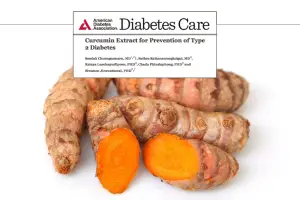11th September 2013
By Sayer Ji
Contributing Writer for Wake Up World
A remarkable human clinical study published in the journal Diabetes Care, the journal of the American Diabetes Association, revealed that turmeric extract was 100% successful at preventing prediabetic patients from becoming diabetic over the course of a 9-month intervention.[1]
Performed by Thailand researchers, the study’s primary object was to assess the efficacy of curcumin, the primary polyphenol in turmeric which gives the spice its golden hue, in delaying the development of type 2 diabetes mellitus (T2DM) in a prediabetic population.
[pro_ad_display_adzone id=”110028″]
The study design was a randomized, double-blinded, placebo-controlled trial including 240 subjects who met the American Diabetic Association’s criteria for prediabetes. All subjects were randomly assigned to receive either 250 mg of curcuminoid or placebo capsules for 9 months.
Type 2 diabetes progression was assessed by measuring a wide range of parameters, including changes in the insulin-producing cells within the pancreas known as β-cells, insulin resistance, and the anti-inflammatory cytokine known as adiponectin, at four different times: baseline, 3-, 6-, and 9-month visits during the course of intervention.
The results were reported as follows:
After 9 months of treatment, 16.4% of subjects in the placebo group were diagnosed with T2DM, whereas none were diagnosed with T2DM in the curcumin-treated group. In addition, the curcumin-treated group showed a better overall function of β-cells, with higher HOMA-β (61.58 vs. 48.72; P < 0.01) and lower C-peptide (1.7 vs. 2.17; P < 0.05). The curcumin-treated group showed a lower level of HOMA-IR (3.22 vs. 4.04; P < 0.001) and higher adiponectin (22.46 vs. 18.45; P < 0.05) when compared with the placebo group. [emphasis added]
The researchers concluded:
A 9-month curcumin intervention in a prediabetic population significantly lowered the number of prediabetic individuals who eventually developed T2DM. In addition, the curcumin treatment appeared to improve overall function of β-cells, with very minor adverse effects. Therefore, this study demonstrated that the curcumin intervention in a prediabetic population may be beneficial.
The full study can be viewed for free on the American Diabetic Association’s Diabetes Care website: http://care.diabetesjournals.org/content/35/11/2121.full
Discussion
Considering that at least 40% of the US population ages 40-74 are believed to have prediabetes, according to CDC statistics, [2] the health implications of this study are profound.
Curcumin, which constitutes approximately 3-4% of dry turmeric powder by weight, is affordable, safe and easily accessible. Moreover, over 600 potential health benefits of curcumin (and/or turmeric) have been documented within the biomedical literature freely available to peruse on either the National Library of Medicine’s open access database (pubmed.gov search: “curcumin”), or for your convenience, our intricately organized Curcumin database.
Recently, we highlighted research on curcumin’s potential ability to heal the diabetic liver. (Read:Turmeric May Repair and Regenerate Diabetic Liver Function) But this is really only the tip of the iceberg. Below you will find the related sections on our Curcumin database indicating curcumin’s value in a wide range of diabetic complications:
| Disease Category | Article Count |
| Diabetes Insipidus | 1 |
| Diabetes Mellitus: Type 1 | 9 |
| Diabetes Mellitus: Type 1: Prevention | 1 |
| Diabetes Mellitus: Type 2 | 13 |
| Diabetes: Bone Quality & Density | 1 |
| Diabetes: Cardiovascular Illness | 11 |
| Diabetes: Cataract | 2 |
| Diabetes: Cognitive Dysfunction | 6 |
| Diabetes: Glycation/A1C | 2 |
| Diabetes: Kidney Function | 4 |
| Diabetes: Liver Disease | 1 |
| Diabetes: Oxidative Stress | 2 |
| Diabetic Microangiopathy | 1 |
| Diabetic Nephropathy | 2 |
| Diabetic Neuropathies | 2 |
| Diabetic Retinopathy | 4 |
Considering the abject failure, if not also sometimes deadly nature of diabetic medications, turmeric (curcumin) provides an ideal alternative. We can only hope that medical professionals who treat prediabetics and diabetics will take seriously this study, especially considering that it was published in the American Diabetic Association’s very own, highly respected journal.
Article Resources
[1] Somlak Chuengsamarn, Suthee Rattanamongkolgul, Rataya Luechapudiporn, Chada Phisalaphong, Siwanon Jirawatnotai. Curcumin extract for prevention of type 2 diabetes. Diabetes Care. 2012 Nov ;35(11):2121-7. Epub 2012 Jul 6. PMID: 22773702
[2] CDC: Diabetes. National Diabetes Fact Sheet; United States, 2003.
Further articles by Sayer Ji
- Turmeric Superior to Chemical Mouthwash In Improving Oral Health
- Biophotons: The Human Body Emits, Communicates with, and is Made from Light
- 10 Natural Substances That Could Help Cure Type-1 Diabetes
- Glyphosate (Roundup) Carcinogenic In the PARTS PER TRILLION Range
- How to Clean Your Arteries With One Simple Fruit
- 13 Evidence-Based Medicinal Properties of Coconut Oil
About the author:
 Sayer Ji is the founder and director of www.GreenMedInfo.com and an advisory board member at the National Health Federation, an international nonprofit, consumer-education, health-freedom organization.
Sayer Ji is the founder and director of www.GreenMedInfo.com and an advisory board member at the National Health Federation, an international nonprofit, consumer-education, health-freedom organization.
He co-authored the book Cancer Killers: The Cause Is The Cure, and is currently co-authoring another book with Tania Melkonian entitled EATomology: An Edible Philosophy of Food.
Check out Sayer Ji’s new collaborative project EATomology.
[pro_ad_display_adzone id=”110027″]







